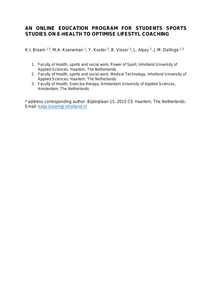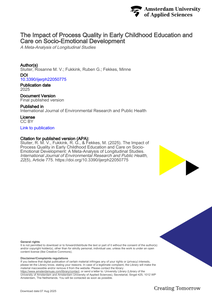Article about social work and social policy in the Netherlands. It gives information about the background, history, the meaning of the profession and the different types of professional areas in which the profession is divided. Other subjects are: social work curricula, the European dimension of social work an current challenges for social professionals in the Netherlands.
DOCUMENT

In dit abstract wordt de ontwikkeling van een online onderwijsmodule beschreven gericht op eHealth voor leefstijlverbetering
MULTIFILE

We investigated the relationship between process quality in early childhood education and care (ECEC) and children’s socio-emotional development in a meta-analysis of longitudinal studies. Our multi-level meta-analysis of 31 publications reporting on 16 longitudinal studies (N = 17,913 children, age: 2.5–18 yrs) demonstrates that the process quality of ECEC is a small but significant predictor of children’s socio-emotional development over time (ES = 0.103, SE = 0.026, p < 0.001, 95% CI: 0.052–0.155). This longitudinal association extends to the age of 18 years in our sample. Process quality of ECEC is, thus, a significant and stable predictor of children’s socio-emotional development and well-being from toddlerhood to adolescence. The longitudinal relationship was moderated by the type of care (center-based vs. home-based) and the informant (parent, professional caregiver, external assessor, or self-report of the child). Implications for future ECEC research are discussed.
MULTIFILE
